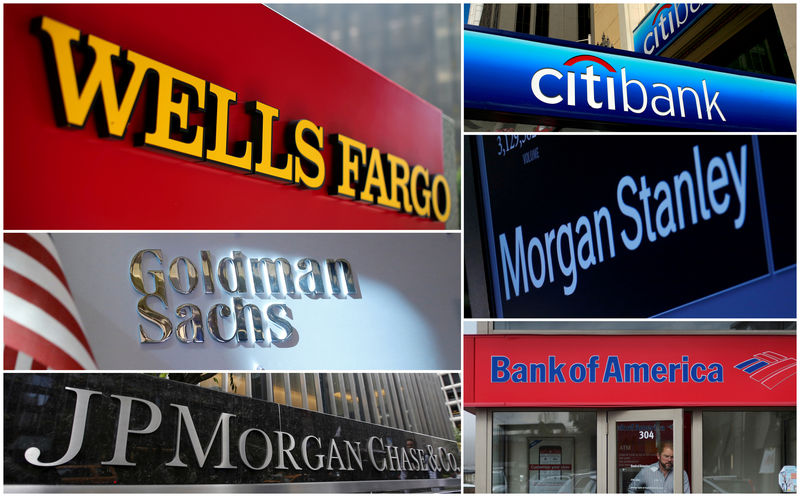By Sinéad Carew and Imani Moise
(Reuters) - Low interest rates and weak trading volume have pushed down Wall Street's second-quarter estimates for the biggest U.S. banks, yet investors still say they want in on the sector.
Citigroup Inc (N:C), JPMorgan Chase & Co (N:JPM), Goldman Sachs Group Inc (N:GS) and Wells Fargo & Co (N:WFC) kick off the second-quarter company earnings season with reports out Monday and Tuesday. On Thursday Morgan Stanley (N:MS) reports.
Analysts expect second-quarter earnings per share (EPS) growth for the S&P 500 bank index of 11%, down from 14.4% on Jan. 1. Revenue growth expectations have dropped to 1.6% from 3.4%, according to the average of estimates gathered by Refinitiv.
This is partly thanks to a flatter yield curve - the narrowing spread between short-term interest rates and long-term rates. On top of this, trading volumes fell in the quarter as many investors stayed on the sidelines due to volatility related to the U.S.-China trade war.
And looking ahead, the Federal Reserve is expected to cut interest rates as soon as this month - a move that some analysts say could add more pressure to bank net interest margins, a closely watched measure of bank profitability which expands or contracts depending on the yield curve.
While lower interest rates make the cost of funding cheaper for most companies, they reduce banks' ability to charge up for its lending services.
"Right now there's just no catalyst for revenue growth. We're talking about an environment where rates are coming down which means net interest margins are under pressure," said Brian Kleinhanzl, analyst at Keefe, Bruyette & Woods based in New York. "Things have to get worse before they get better. We haven't seen the worst yet in our view. We still expect rates to go lower putting further pressure on bank earnings."
The dimming outlook has already diminished valuations with the bank index trading at about 10.2 times estimates for next 12 months earnings, compared with its average multiple of 12.4 for the last 10 years, according to Refinitiv data.
But some investors say revenue worries are overblown and that banks could make it out of the rate cycle better than expected. Further, the lower valuations also look attractive compared with the benchmark S&P 500's (SPX) 17.1 multiple.
The S&P bank index has risen 17.5% year-to-date while the S&P 500 has risen 19.7%.
"Because of the fact rates have been pushed lower and the yield curve continues to be flat, (banks are) somewhat unloved," said Michael Arone, chief investment strategist at State Street Global Advisors in Boston referring to bank stocks.
"To me that makes an interesting investment and the catalyst for banks would be the continued loosening of regulations and a steepening of the yield curve."
Leuthold Group Chief Investment Strategist Jim Paulsen also likes banks. He expects a steepening yield curve to help net interest margins.
Investors like Paulsen expect the yield curve to steepen if Fed rate cuts improve economic growth. Aaron Dunn, portfolio manager for large cap value at Eaton Vance in Boston, says investors have been too bearish on banks.
But he says it is important to be selective as valuations are not so compelling that he is "pounding the table to buy." For example, with JPMorgan's price-to-tangible book value ratio close to 2, Dunn would like "much faster earnings growth to get behind it." JPM is expected to report earnings per share (EPS) growth of 9.4% to $2.51 when it issues results on Tuesday, according to estimates gathered by Refinitiv.
In comparison, Dunn is "very interested" in Goldman Sachs which has a price-to-tangible book value ratio close to 1 and is expected to report an EPS decline of 16.5% to $5.
Bank executives have also downplayed the impact of interest rates in recent investor conferences. Citigroup said a 25-basis point rate shift would cut revenue by $50 million per quarter. Citi, one of the least rate sensitive banks of the pack, typically makes upwards of $70 billion in revenue annually.
Last month Wells Fargo executives said a steepening yield curve following a Fed rate cut would help its mortgage business.
Bank of America Corp (N:BAC), one of the most rate-sensitive banks, touted its ability to grow profit regardless of the economic environment, although it has admitted it may not grow as fast. Last quarter Bank of America, due to report results Wednesday, said it expects 3% net income growth for the year compared with 6% in 2018.
Still investors will be looking for signs of confidence from executives that banks can continue growing.

"Earnings aren't going to be great but everybody already knows that. What's the outlook for the back half of the year?" said Eaton Vance's Dunn.